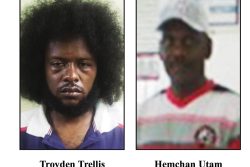 Even in the harsh fluorescent light of the living room, the solid slab stands out with its sharp Mesoamerican motifs, carefully cut into the dense purpleheart hardwood, which has deepened over time into a strong, rich burgundy. With straight grains and natural resins, the striking carving survived its initial shipment in a boatload of lumber from Guyana to Barbados.
Even in the harsh fluorescent light of the living room, the solid slab stands out with its sharp Mesoamerican motifs, carefully cut into the dense purpleheart hardwood, which has deepened over time into a strong, rich burgundy. With straight grains and natural resins, the striking carving survived its initial shipment in a boatload of lumber from Guyana to Barbados.
Nearly three decades ago, I had saved enough to buy it from the renowned Continental artist and Guyanese sculptor, Desmond Alli, as a personal pledge of hope, and a reassuring, durable symbol in an uncertain time. When I am homesick, I still run my hands over the smooth indigenous headpiece and the stone-like glyphs that decorate the lower half, in tribute to the years he spent roaming through Mexico, and the ancient places of Latin America.
Later, pregnant with my first child and on prolonged sick leave due to severe hyperemesis gravidarum which turned into all-month sickness, I was utterly exhausted, having been ferried in and out of Woodlands Hospital, facing stratospheric bills, a depleted bank account and dwindling options. I became such a familiar figure at the private health institution, that the sympathetic nurses and even the admissions officer knew me on a first name basis, and would shake their heads and sigh, “Oh Indranie, not you again!”
On the eve of a very awful night of heavy bleeding and an allergic reaction to a steroid, my dedicated and worried gynaecologist, Dr. Jennifer Basdeo-Green advised me she would have to consider terminating the pregnancy to save my life if I did not improve by morning, and recommended that I pursue travelling overseas for further treatment when my condition stabilised. In between consciousness and the ongoing bouts of nausea, I prayed to all the gods I could summon in that vast, empty hospital room to spare us – and they did.
A trio of my wonderful artist friends, Desmond; the Rastafarian sculptor, Aubrey Estwick and the cheerful, unpretentious painter, Peter Edwards came by one evening to cheer me up and see me off at my West Ruimveldt rental, as I prepared to leave for Barbados. Since I had no extra cash to splurge as a lowly paid journalist, we reverted to an agreed barter system, with them taking whatever of my meagre possessions they fancied. Aubrey, who had carved a special mahogany study of a symbolic Guyanese mother and child locked together, chose the boom box on which I played classics and calypsoes, Peter swapped a colourful oil abstract study for the large wine-coloured rug, and Desmond offered one of his signature pyramid pieces dedicated to his dream of Guyanese unity, for my ancient television set.
This week, the memories of our many happy encounters flooded back as I read Desmond’s most recent distressing letter published in the Stabroek News. At 68, he is now facing his own medical problems. “This may well be my last letter given my state of health,” he admitted. In 2016, as the artist was carving pieces at his family’s East Ruimveldt home, in preparation for Guyana’s 50th independence anniversary celebrations, he was attacked by a gang of thugs led by an estranged relative, and repeatedly hammered in his head and beaten until he collapsed. Fearing that he would be killed, and understandably anxious over his family and 91-year-old mother, Stella, Desmond went public, but his repeated calls for the authorities to apprehend the suspects were ignored in a country where the poor and most vulnerable have no voice. “These men came to kill me,” he recounted during a visit to my Trinidad home in 2019, while in transit from a successful exhibition in the United States of America.
The artist was due for cataract surgery on his right eye last Saturday. “Unfortunately, on the 23rd I suddenly fell ill, I was rushed to the Woodlands Hospital on Friday evening where I was admitted with a stroke. Dr. Etwaru, who was the physician, told me that it would require hospitalization for at least 4 days and therapy. Given the cost which was already $145,000 and growing, I told the good Doctor that I would have to self-discharge, which left me without any prescription medications, etc. He said that if I was unable to afford the treatment that a referral could be made to the Georgetown (Public) Hospital (Corporation),” which “was in a bad state even before the outbreak of COVID-19.”
Suffering from hypertension and diabetes, he ended with, “I am an artist with some valuable works that can help assist with my medical bills, is there any Guyanese who would be willing to help me in my time of need? Contact me at Tel#223-4636.”
As General Secretary of the shrinking Guyana United Artists group, Mr Alli has written a plethora of public letters lamenting the shabby treatment of members and the lack of proper Government support and patronage. He has been left to mourn the passing of greats like George Simon, in Spain, and Osaze, neglected and impoverished, in Mahaica. They both died on July 15, 2020.
Osaze was a political activist too, being a founding member of the Working People’s Alliance (WPA) and like Desmond, also part of the “Brigade” or the party’s distribution unit. Mr Alli recalled that Osaze spent over a decade fighting for free and fair elections. By 2019, Osaze had completely lost vision in both eyes and “could not afford private medical attention like so many of us – my mother also lost her sight in two unsuccessful surgeries at the Georgetown Public Hospital,” he said.
Jailed and beaten countless times for handing out copies of the “Dayclean” newspaper or putting up related posters published by the opposition party, during the years of the Forbes Burnham dictatorship, Desmond told me again this week of the house searches and detention, and of being tortured with others in the station at Bartica in 1979. The cops interrogated the activists separately and used a hot, bright light device that left the men with marks and burnt skin. He refers to a taxi driver who was detained and beaten to death simply on suspicion of transporting the illegal newspaper.
It was in 1978, after returning home from self-exile in Latin America, that Desmond Alli met the charismatic man and revolutionary who exerted the most “profound influence on my thinking and all the work that I have done.” Dr Walter Rodney was out in the back streets of the community, building his “groundings” campaign, distributing “Dayclean” and meeting and chatting with ordinary people about their problems. He strolled into the yard where Desmond was busy on a piece depicting a map of Africa. “He stopped. We spoke quietly about the piece and then about the issues in Latin America and Guyana, and shared our similar experiences, since I had done work in the severely depressed communities such as in Rio de Janeiro in Brazil.” Dr Rodney would return alone to invite him to join in the growing campaign for political and social change, but on one occasion the army of spies whipped up residents loyal to the governing regime to hurl a barrage of rocks and missiles.
A popular leader who threatened the status quo, Dr Rodney was assassinated in June 1980, months before extensive and shocking alterations to the Guyana Constitution were forced through, leading to the creation of a most powerful Executive Presidency, immune to prosecution, that remains in place, despite promises of change by successive governments led by the two main parties, long criticised by Mr Alli. He has continued a personal crusade for constitutional reform, while seeking to pursue the elusive vision of national unity and help keep the memory of Dr Rodney alive.
Statements such as, “Every thinking GUYANESE must realise by now that these political parties…have driven us into a state of servitude….we live and die serving, fulfilling their whims and fantasy…” have not endeared him to the ruling administrations. Advocating art as an instrument in the transformation of society, he observed, “I don’t think that many of my colleagues who once stood alongside Walter Rodney chanting ‘People’s power, No Dictator’ share these ideals anymore. Times haven’t changed, it is people who have changed – into who they really are.”
ID’s floor piece by Desmond Alli split during a journey, a division that the artist thinks is a painful metaphor for Guyana today. Her Guyana Unity pyramid purchase was seized at the then Timehri Airport from her partner despite his diplomatic status and passport. The Customs Officers were angry they had found no drugs in the small collection.








